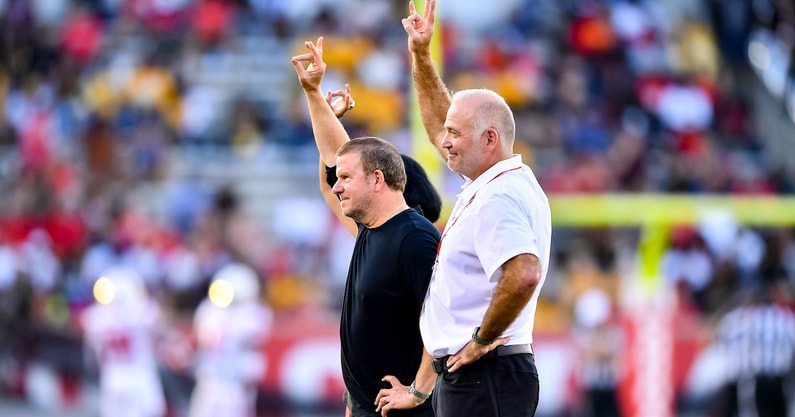Houston announces Chris Pezman is no longer athletic director, search for successor to begin immediately

Houston is moving on from athletic director Chris Pezman, the school announced on Thursday. Pezman, a former Cougars football player, was in the job for more than six years.
A search for Pezman’s replacement will begin immediately as Raymond Bartlett, Houston’s senior vice president for administration and finance, will serve as the interim athletic director. As the Cougars announced the change in athletic leadership, university president Renu Khator cited “a paradigm shift” in college athletics spurring the decision.
“Chris Pezman has ushered our athletics program though a period of incredible transformation, and we are grateful for his leadership over the past six years,” Khator said in the release. “He has been a pivotal part of our entry into the Big 12 Conference and championed the success of student athletes on the field and in the classroom. This was a necessary decision as we navigate a paradigm shift in collegiate athletics. I want to thank Chris for hid dedication to UH and our student athletes. On behalf of the University, I wish Chris and his family the very best.”
Big changes could be coming for the Big 12
The Big 12 Conference provided college athletics some summer discussion fodder with a pair of potential moves for the league that were reported mid-June: A potential deal for naming rights of the league, and another possible deal to give a private equity firm a stake in the league. And these are not moves that are created equally.
While the potential for the Big 12 to apparently become the “Allstate 12” conference, or something similar, kicked off plenty of jokes and online furor, it would be a deal with private equity that could ultimately come back to haunt the league and its member schools, as far as On3’s Andy Staples and Pete Nakos are concerned.
And the issue is borne from a key difference between how these respective deals would function. Naming rights, while easily mocked, is essentially just the league changing its title branding for an infusion of cash. Operations would not be effected, save for a bit more money to distribute to schools. Private equity, on the other hand, would be staking the league a large up-front sum of money — presumably to make up for revenue shortfalls relative to the Big Ten and SEC — and get partial control over the league, member schools, and get paid back with interest over a term of years (likely decades). The former of those would likely be tolerable for college athletics, and the latter could be disastrous.
Top 10
- 1Breaking
Beau Pribula injury
Mizzou QB's status changed
- 2New
Ole Miss, Lane Kiffin
Key meeting today
- 3
Dave Aranda
Baylor announces future
- 4
Jamal Mashburn
Calls out Kentucky
- 5Hot
Most-watched teams
Tracking Top 10 through Week 12
Get the Daily On3 Newsletter in your inbox every morning
By clicking "Subscribe to Newsletter", I agree to On3's Privacy Notice, Terms, and use of my personal information described therein.
“They are going to boss around, they are going to tell you what to do, and there is probably a higher percentage that they tell you to cut sports than if you don’t bring in private equity,” Nakos said.
Staples expanded further on how things might go for athletic departments if they open the door for a private equity firm to have a say.
“Yeah, because they’ll be like ‘Which of these sports make money?’ And they’ll be like, ‘Football and men’s basketball.’ And they’ll go, ‘Cut everything else.’ And you’ll go, ‘Well, no. There’s a thing called Title IX.’ ‘Cut exactly what you need to comply with Title IX and have nothing more than that.’ That’s what they’re going to say. It is a pretty dangerous situation, it’s a dangerous path to go down,” Staples said.
The exact nature of a potential Big 12 private equity deal is also still unknown. The terms that were reported on Thursday are not final, by any means, but the broad strokes of a deal would be a payout to the Big 12 — ergo the schools in the league — in the neighborhood of $800 million to $1 billion from a firm in Luxembourg, for about a 20% stake in the league, along with getting paid back with interest.
